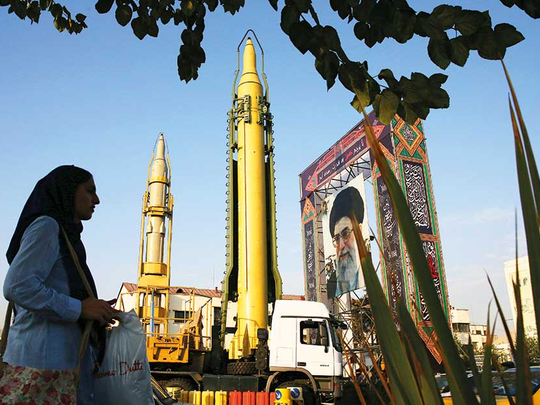
Dubai The chief concern for countries that have supported President Donald Trump’s strong stance against Iran has been the Tehran regime’s behaviour.
A statement by the UAE Foreign Ministry noted that “for too long, the Iranian regime has spread destruction and chaos throughout the region and beyond.
The nuclear deal – the Joint Comprehensive Plan of Action (JCPOA) – offered Iran an opportunity to engage responsibly with the international community.
Instead, it only emboldened Iran to intensify its provocative and destabilising behaviour.
Importantly, the new US strategy takes the necessary steps to confront Iran’s malign behaviour in all its forms – including its growing ballistic missile programme, support for terrorist organisations like Hezbollah and the Al Houthis, cyber-attacks, interference in its neighbours’ domestic affairs, and threats to the freedom of navigation.”
Analysts in the region believe Washington’s position still needs the support of the US Congress, and America’s international allies to pressure Iran to submit to US demands and introduce changes to the controversial nuclear deal.
“The new American position differs from previous stances,” said Mohammad Abbas Naji, an expert in Iranian affairs at the Cairo-based Al Ahram Strategic Studies Centre.
Trump connected the “dangers of the nuclear race and the dangers of Iran’s regional role” and how Tehran “used the agreement to further spread chaos and instability in the region,” Naji told Gulf News.
Trump passed on the authority to decide on the nuclear agreement to the US Congress. But he warned he would terminate the deal if it was not rewritten to his liking. Also, he stopped short of withdrawing from the agreement that was signed in 2015 between Iran and the P5+1 – the US, Britain, France, Russia, China plus Germany.
Door open
He kept the door open for any last minute announcement of withdrawing from the agreement.
“The ability of President Trump to take the next move depends on the Congress’ position, and the positions of Washington’s regional and international allies,” said Naji.
“The American position is important, and the new US strategy, at least, helped us to tell the world that Iran is a source of destabilisation, and is an agent of chaos in the region and the world,” said Mohammad Al Harbi, a Gulf analyst based in Dubai.
“America’s new strategy targets the [powers in] Iran, including the Revolutionary Guard, which is supporting the militias fighting [Iran’s] proxy wars” in the region.
“We are awaiting action on the ground because words are not actions,” Harbi said.
Trump threatened to impose economic sanctions on Iran and to put the country’s elite Revolutionary Guard on the terror list.
Washington’s position on the nuclear deal with Iran contradicts that of the European countries.
The European Union defended the agreement, and said there was no need to change it.
US-EU gap
The gap between the two sides of the Atlantic is wide, said analysts.
“America’s international allies are still insisting that the [nuclear] agreement is going well, and [believe] Washington’s stance could eventually lead to the collapse of the agreement, and give extremists in Iran the opportunity to rise up,” said Naji.
“They are also warning that withdrawing from the agreement would create a new North Korea-like scenario,” he said, referring to the current international crisis over North Korea’s nuclear programme.
The differences between the US and the EU on the nuclear deal is working in Iran’s favour, said analysts.
This is why is it is vital for Washington to work on bridging the gap with other powers on in its position towards Iran.
“Europe needs America more than America needs Europe,” said Harbi, who concluded that the US Congress will have the final word.












